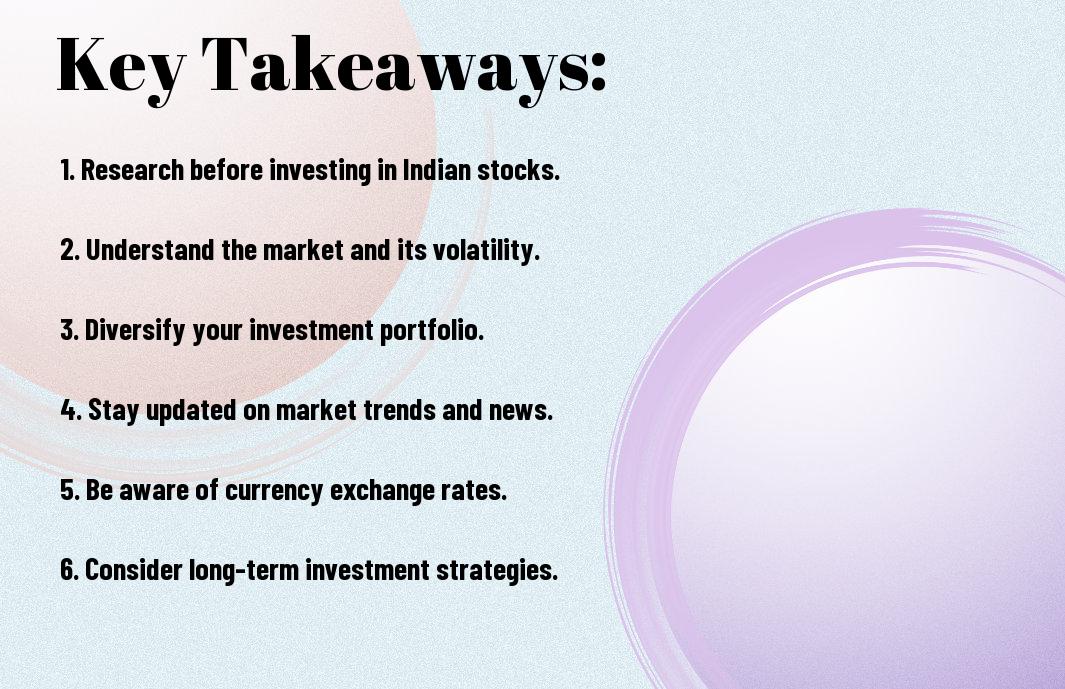Investing in the Indian stock market can be a lucrative opportunity, but it also comes with its own set of risks and challenges. If you are looking to dip your toes into the Indian stock market, here are five essential tips to help you navigate this complex and dynamic market. First and foremost, it’s crucial to understand the Indian economy and its current state before diving into the stock market. You also need to stay updated with the latest news and market trends to make informed decisions. Additionally, diversifying your investment portfolio and conducting thorough research on the companies you are interested in are key to success. Lastly, consulting with a financial expert can further enhance your investment strategy and minimize risks in the Indian stock market.
Key Takeaways:
- Understanding the market: Before investing in the Indian stock market, it is essential to have a good understanding of how the market works, including factors that influence stock prices and market trends.
- Thorough research: It is crucial to conduct thorough research on potential investment opportunities, including analyzing company financials, industry trends, and market conditions, to make informed decisions.
- Diversification: Diversifying your investment portfolio can help spread risk and potentially enhance returns. Consider investing in different sectors and types of assets to minimize the impact of market fluctuations.

Understanding the Indian Stock Market
The Indian stock market is a dynamic and complex entity, influenced by a myriad of factors, both domestic and international. Understanding how the market operates is crucial for making informed investment decisions. You must familiarize yourself with various aspects of the market to ensure that you maximize your potential returns while minimizing risks.
Key Features of the Market
The Indian stock market comprises key features that you must comprehend before investing. These features include
- Stock Exchanges: The two primary stock exchanges in India are the National Stock Exchange (NSE) and the Bombay Stock Exchange (BSE).
- Indices: The major indices include the Nifty 50 and the Sensex, providing an overview of the market’s performance.
- Market Capitalization: This indicates the size of a company and is crucial in determining its investment potential.
- Liquidity: It’s important to consider the ease at which you can buy or sell stocks in the market.
- Volatility: The Indian stock market is known for its volatility, with prices fluctuating frequently, presenting opportunities as well as risks.
Knowing these features will help you navigate the market effectively and make informed decisions.
Regulatory Bodies and Compliance
When investing in the Indian stock market, it’s essential to be aware of the regulatory bodies and compliance standards that govern it. The Securities and Exchange Board of India (SEBI) is the primary regulator, overseeing the functioning of stock exchanges, intermediaries, and investors. Compliance with SEBI regulations is mandatory to maintain transparency and protect the interests of investors. Your understanding of these regulatory aspects will help you ensure that your investments are in line with the prescribed guidelines, mitigating potential risks.

Setting Investment Goals
However, before you start investing in the Indian stock market, it is crucial to set clear investment goals. Whether you are looking to build a retirement fund, save for your child’s education, or simply grow your wealth, having specific goals will help you make informed investment decisions. If you are new to stock market investing, you can refer to a comprehensive guide like How to Invest in the Share Market? Tips for Beginners to gain a better understanding of the basics.
Long-Term vs Short-Term Objectives
When setting your investment goals, it’s essential to distinguish between long-term and short-term objectives. Long-term goals typically involve investing for a period of more than five years, such as retirement planning or creating a substantial wealth base. On the other hand, short-term objectives can include buying a home, funding a vacation, or saving for a big-ticket purchase within 1-5 years. Your investment approach and the level of risk you can take will vary based on whether your goals are long-term or short-term.
Assessing Risk Tolerance
Assessing your risk tolerance is an important aspect of setting investment goals. Your risk tolerance is influenced by factors such as your age, financial situation, and investment experience. If you are young and have a stable income, you may be more willing to take on a higher level of risk in pursuit of greater returns. However, if you are nearing retirement or have a lower tolerance for potential losses, you may prefer a more conservative investment approach. Understanding your risk tolerance will help you align your investment goals with the most suitable investment strategies.
Strategies for Successful Investing
Now that you have decided to invest in the Indian stock market, it’s crucial to have a strategy in place for successful investing. Here are some key strategies to help you navigate through the complexities of the market and make informed investment decisions.
Research and Analysis Techniques
When it comes to investing in the Indian stock market, thorough research and analysis are essential. Before making any investment decisions, you should thoroughly research the companies you are interested in, their financial health, market trends, and economic indicators. Utilize tools such as financial reports, company announcements, and market analysis to make informed choices. Technical analysis can also be a valuable tool to identify trends and patterns in stock prices, helping you make more precise entry and exit decisions.
Diversification Principles
One of the most important strategies for successful investing in the Indian stock market is diversification. By diversifying your investment portfolio across different sectors and industries, you can minimize risk and protect your investments from market volatility. Ensure that your portfolio includes a mix of large-cap, mid-cap, and small-cap stocks, as well as investments in sectors such as finance, healthcare, technology, and consumer goods. This will help you spread your risk and maximize your potential for returns.
Advanced Tips for Experienced Investors
After gaining some experience in the Indian stock market, you may be ready to delve into more advanced investing strategies. Here are some tips to help you make the most out of your investments:
- Technical Analysis vs. Fundamental Analysis
- Diversification
- Options Trading
| Technical Analysis | Looks at historical price and volume data to predict future price movements. |
| Fundamental Analysis | Studies company financials, management, and industry trends to determine the intrinsic value of a stock. |
| Pros | Spreads risk across different assets, reducing potential losses. |
| Cons | May limit potential returns if a particular asset performs exceptionally well. |
| Benefits | Provides the opportunity to profit from market volatility and hedge existing positions. |
| Risks | Can lead to substantial losses if not executed properly. |
Leveraging Market Trends
As an experienced investor, you understand the importance of identifying and leveraging market trends to maximize your returns. By recognizing patterns and understanding market sentiment, you can make more informed investment decisions. Utilize technical analysis tools and keep a close eye on market indicators to stay ahead of the curve. However, it’s crucial to remember that market trends can be unpredictable and can change rapidly, so always approach trend analysis with caution.
Taxation and Its Impact on Investments
When you’re an experienced investor, you understand that taxation plays a significant role in your investment strategy. Your investment decisions may be influenced by the tax implications, such as long-term capital gains tax and dividend distribution tax. Understanding the tax structure and its impact on your investments is crucial for maximizing your after-tax returns. Keep abreast of any changes in tax laws and consult with a financial advisor to optimize your investment portfolio for tax efficiency.
Conclusion
Now that you have learned the 5 tips for investing in the Indian stock market, it’s important to remember that investing always comes with risks. However, by following these guidelines, you can increase your chances of making informed and successful investment decisions. Always stay on top of market trends, diversify your portfolio, conduct thorough research, seek professional advice when needed, and practice patience in your investment strategy. By incorporating these tips into your investment approach, you can navigate the Indian stock market with confidence and potentially reap the rewards of your careful and strategic investment choices.
FAQ
Q: What are the key tips for investing in the Indian stock market?
A: The key tips for investing in the Indian stock market are to conduct thorough research on the companies you are interested in, diversify your portfolio, stay updated on the latest market trends, seek advice from financial experts, and have a long-term investment strategy.
Q: How important is research when investing in the Indian stock market?
A: Research is crucial when investing in the Indian stock market. It helps you make informed decisions, understand the financial health of the companies you want to invest in, and identify potential risks and opportunities. Without research, you may end up making uninformed investment choices that could lead to financial losses.
Q: Why is diversifying your portfolio important when investing in the Indian stock market?
A: Diversifying your portfolio is important in the Indian stock market to reduce the risk of financial loss. By investing in a variety of stocks from different sectors, you can spread your risk and minimize the impact of market volatility. It also allows you to participate in different sectors of the economy, potentially increasing your overall returns.

